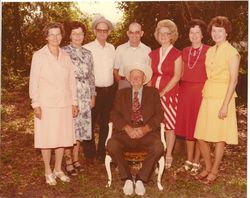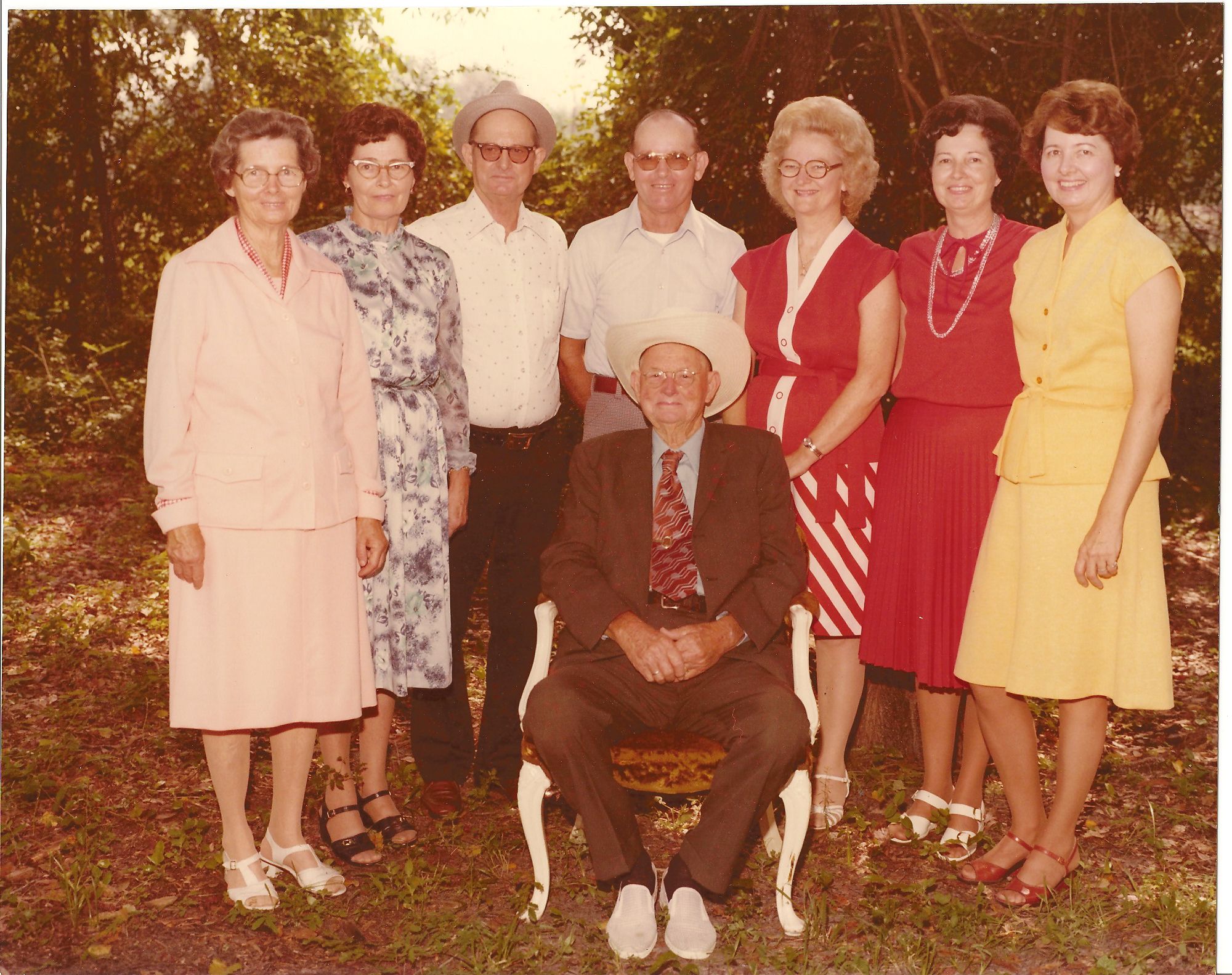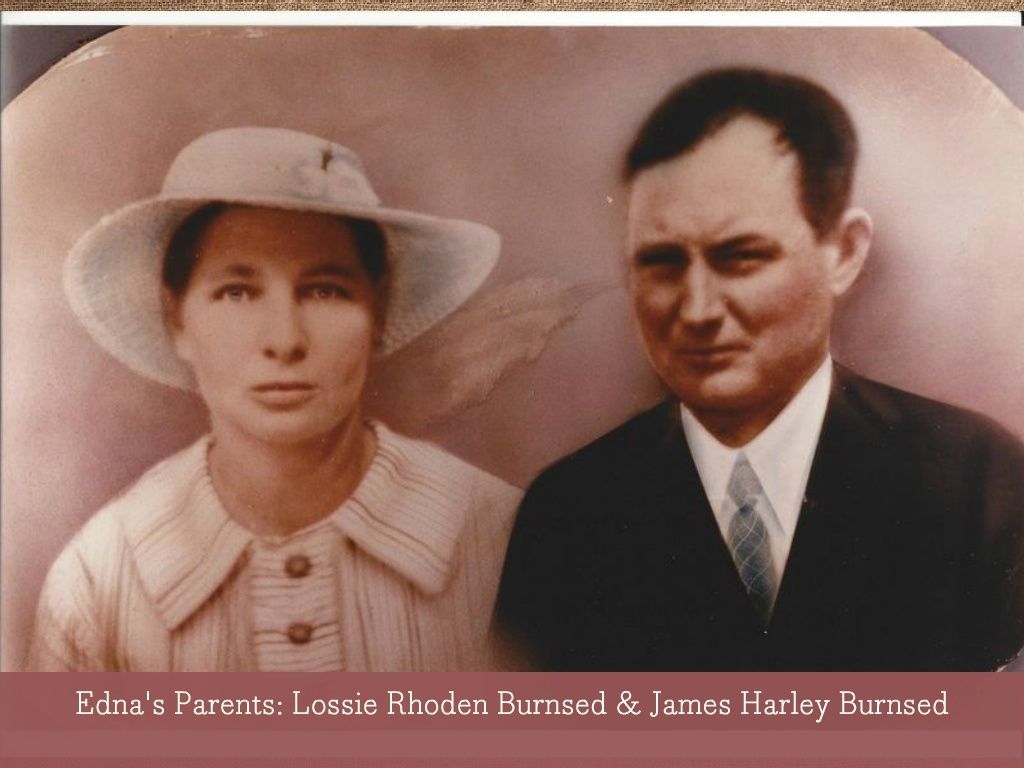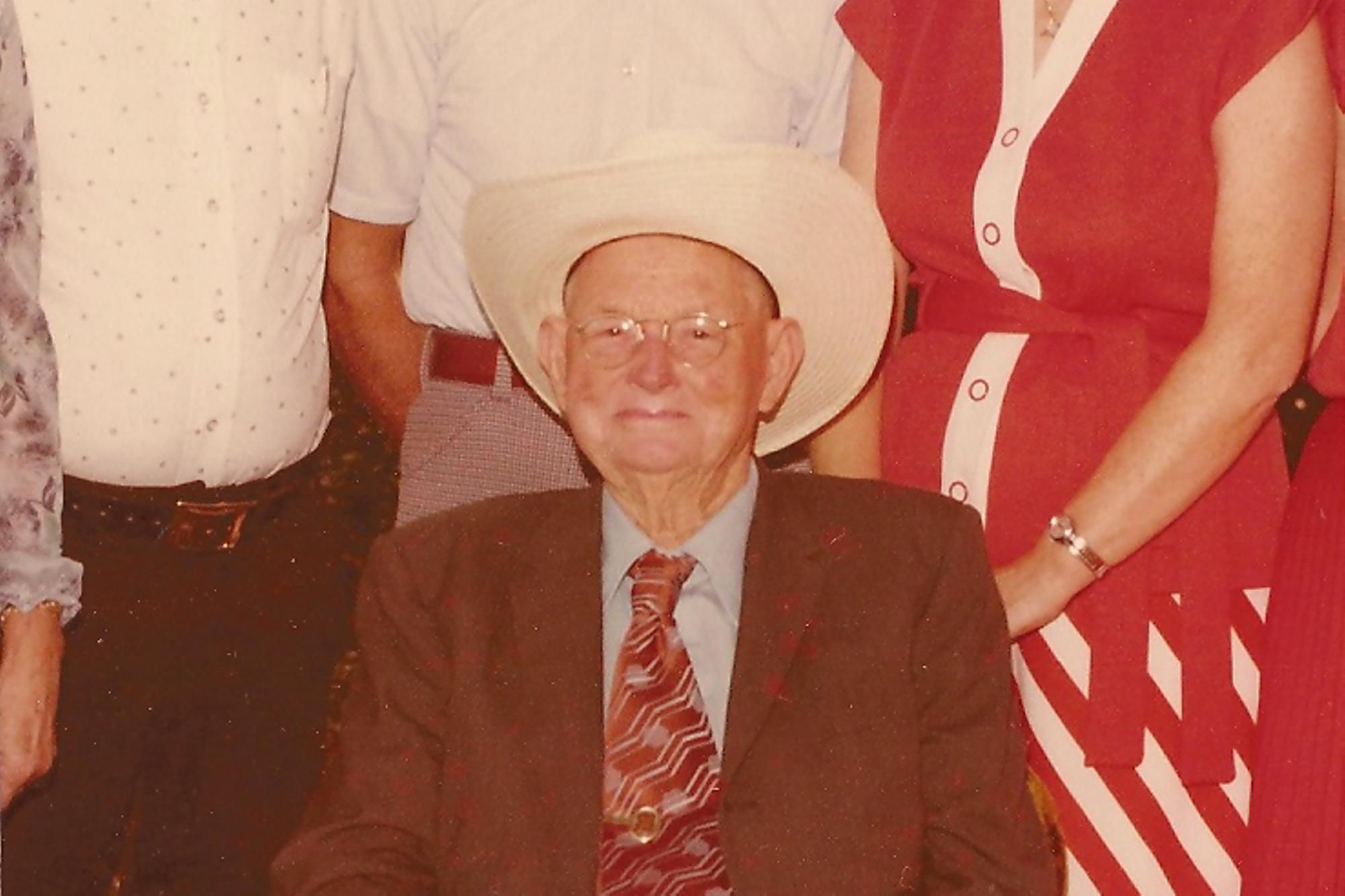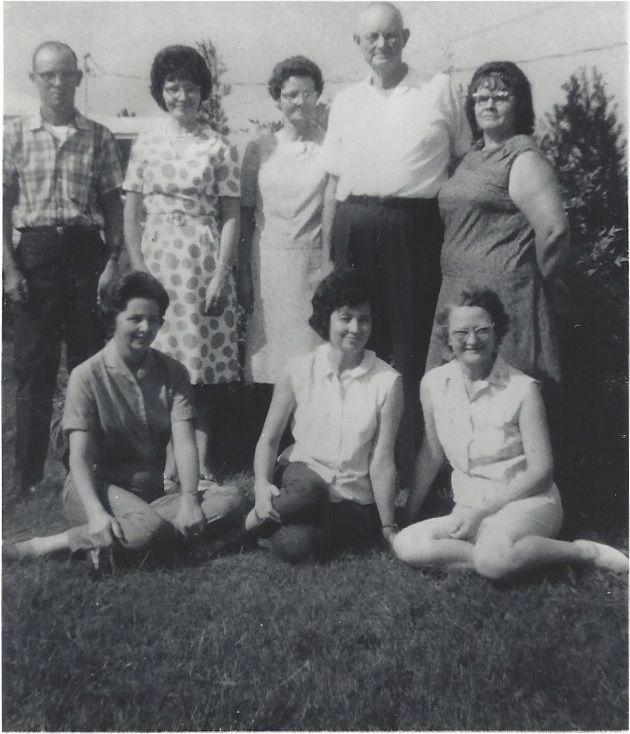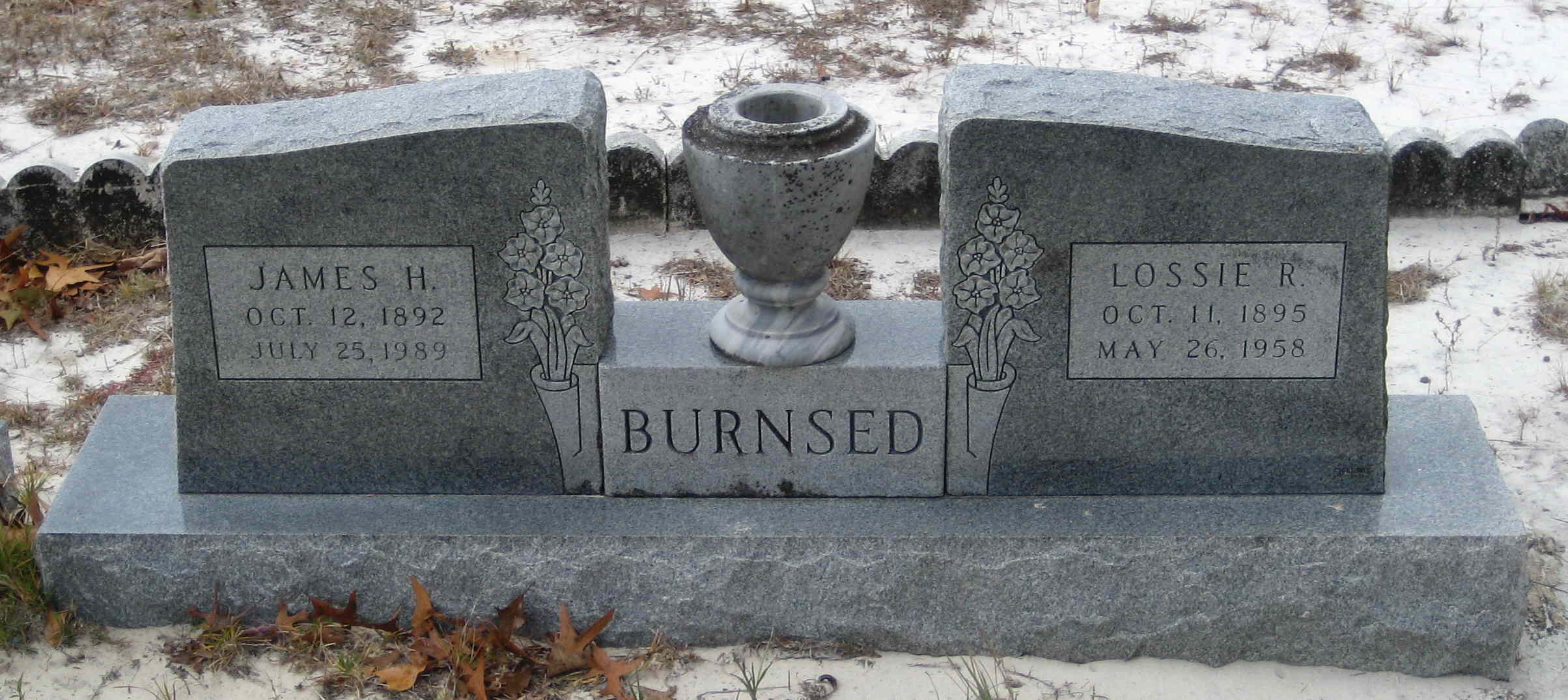"There weren't no bridges or graded roads," said Harley, who never left the area where he was born. "There weren't nothing but horse cart trails and horses or mules for transportation. Very few people had carts. My daddy was the first in the community to have a wagon."
"And," he said, "boys wore dresses back then. I was a great big boy when Mama made me a pair of knee pants. I looked down and saw 'em on me and started crying."
"My daddy grew long cotton and when we'd go into Sanderson to sell it for 5 cents a pound in the seed, we'd leave 'bout 3 a.m., before daylight The reason I remember that so good is because my mama would fix us a good breakfast and we'd stop over by Cedar Creek to eat it. There'd always be a great big slab of white bacon and oh, my Lord, was that good ... too good to even talk about," he said with a shudder, obviously overcome by the memory.
"My daddy was a great hunter," he said, "and he took me with him. None of the other kids cared to go too much. A coon hide brought 50 cents and a seven foot gator hide a dollar fifty.
"By being a good hunter we got along good in them days cause there weren't no laws governing the Okeefeenokee swamp then. The bears and deer were fat on acorns and blueberries and the meat was so sweet,' he said.
"How did you fare during the Depression when things were already so bad?" I asked.
"Well, the first depression I ever heard tell of was once me and my daddy was over in Moniac and there was some talk 'bout it and ole man Riley Crews spoke up and said, 'They say there's a Depression, but I can't tell no difference.' And he couldn't 'cause all we ever had to buy back then was a barrel of flour and maybe some coffee ever so often. We raised or grew or hunted the other foods we needed. We were pretty self dependent on what the land produced for us and we learned how to manage and plan for our survival.
During the late 29 and 30 years, those who could afford to hunted for bargains paid such prices as 20 cents a pound for meat. A wool blanket was $1. An eight room dining room set cost $50 and a 9x12 rug cost $6. Most items came from the Sears catalog, but occasionally the rural families would travel to the big city to shop.
Harley said as a lad he made his first trip by train to Jacksonville with a school teacher. He said he "really got an education."
"I didn't even know horses wore shoes and I heard these horse and surrey buggies clopping down Bay Street, which was brick then. Boy, that was amazing to me," he said.
The first airplane and automobile didn't surprise Burnsed any.
"I knew they were coming all along cause I read about it in the Bible," he said. "It (the Bible) says that men would go up in the air without wings and that carriages would be drawn without horses, so I was expecting it."
Harley fell in love with Lossie Rhoden, a neighbors daughter.
"We were going to school together-and well you know what happens in school," he said. "Well that was one of the rare opportunities young people had to meet and become acquainted at that time."
"I think I got almost to the third grade before I married her on December 31, 1911," he said.
The Burnsed's began their life together as tenant farmers.
"I didn't like that too much," he said, "working for someone else. I wanted a place of my own but I only had about 30 dollars and a mule.
"About that time the Bo-weevil came into these here parts and ate up all the cotton," he said. "Bootlegging come along so I went into the bootlegging business like a lot of other people and that's how I got the money to get me some property. I reckon the Lord sent the bootlegging for a purpose after the Bo-Weevil ate up all the cotton," he said. "Ain't nary a still in these parts nowadays. A lot of people abandoned their farms back then and moved away getting what they could for 'em. I know of one 350 acre farm that sold for $400 and the man moved to Macclenny and plowed other people's gardens with his mule up 'til he died. That's all he'd ever done and all he knew to do to make a living."
The Burnseds became the parents of seven children, five girls and two boys. Lossie lived to see her first grandchild. After Lossie's death, Harley married Margie Padget. That was 20 years ago.
Harley said he was a grown man before he heard about Santa Claus. Even the real meaning and significance of Christmas eluded Burnsed until he had a family of his own.
"Nope, I never heard tell of Santa Claus, or Christ's birth when I was a youngin'," the amicable 87-year-old Moniac native said. "When I did hear tell of it (Santa and Christmas) I thought it was a mighty nice thing for kids. I still do," he said, explaining there was no big meal prepared for the occasion in his childhood home. "We did know to exchange gifts, but I was never told why.
If my parents knew they didn't tell me. We made our own gifts because there sure wern't no place around to buy anything. Me being the oldest of my parents children would go into the swamp and cut down black gum trees to build wagons and other toys."
"I had a good time all my life," he said, "growing corn, peanuts, cane, raising hogs, cows, and now goats."
He said he never joined a church although there were all kinds of people coming 'round wantin' me to join up. I tell 'em I don't have time. I'm too busy taking sick people to the doctor and the Lord's taking care of me." He admits he is basically hardshell Baptist and says he's read the Bible through twice.
Failing eyesight prevents him from doing many of the things he would like to do, but he still manages to laugh and tell about the good ole days.
"What are you telling her?" quizzed his wife Margie as she returned from a shopping trip to Macclenny.
"O, I told her the facts," he jovially replied, "but I could tell her some really big stories," he said with a twinkle in his eye.
"You see, once there was this really big bear and me and my daddy.......
Update 1993: Harley Burnsed who was born Oct. 12, 1892 died July 1989 at the age of 96 two months from his 97th birthday. He is buried at Oak Grove Cemetery north of Macclenny.
His children are: Rosa Thomas, Lottie Thrift (died 1992), Willard Burnsed, Nathan Burnsed, Geneva Griffin, Minnie Johns, Edna Sands.
Once Upon A Lifetime in and near Baker County, Florida
Volume No. 1 By La Viece (Moore-Fraser) Smallwood Copyright 1993
Permission has been granted by the author for posting to this page.
"There weren't no bridges or graded roads," said Harley, who never left the area where he was born. "There weren't nothing but horse cart trails and horses or mules for transportation. Very few people had carts. My daddy was the first in the community to have a wagon."
"And," he said, "boys wore dresses back then. I was a great big boy when Mama made me a pair of knee pants. I looked down and saw 'em on me and started crying."
"My daddy grew long cotton and when we'd go into Sanderson to sell it for 5 cents a pound in the seed, we'd leave 'bout 3 a.m., before daylight The reason I remember that so good is because my mama would fix us a good breakfast and we'd stop over by Cedar Creek to eat it. There'd always be a great big slab of white bacon and oh, my Lord, was that good ... too good to even talk about," he said with a shudder, obviously overcome by the memory.
"My daddy was a great hunter," he said, "and he took me with him. None of the other kids cared to go too much. A coon hide brought 50 cents and a seven foot gator hide a dollar fifty.
"By being a good hunter we got along good in them days cause there weren't no laws governing the Okeefeenokee swamp then. The bears and deer were fat on acorns and blueberries and the meat was so sweet,' he said.
"How did you fare during the Depression when things were already so bad?" I asked.
"Well, the first depression I ever heard tell of was once me and my daddy was over in Moniac and there was some talk 'bout it and ole man Riley Crews spoke up and said, 'They say there's a Depression, but I can't tell no difference.' And he couldn't 'cause all we ever had to buy back then was a barrel of flour and maybe some coffee ever so often. We raised or grew or hunted the other foods we needed. We were pretty self dependent on what the land produced for us and we learned how to manage and plan for our survival.
During the late 29 and 30 years, those who could afford to hunted for bargains paid such prices as 20 cents a pound for meat. A wool blanket was $1. An eight room dining room set cost $50 and a 9x12 rug cost $6. Most items came from the Sears catalog, but occasionally the rural families would travel to the big city to shop.
Harley said as a lad he made his first trip by train to Jacksonville with a school teacher. He said he "really got an education."
"I didn't even know horses wore shoes and I heard these horse and surrey buggies clopping down Bay Street, which was brick then. Boy, that was amazing to me," he said.
The first airplane and automobile didn't surprise Burnsed any.
"I knew they were coming all along cause I read about it in the Bible," he said. "It (the Bible) says that men would go up in the air without wings and that carriages would be drawn without horses, so I was expecting it."
Harley fell in love with Lossie Rhoden, a neighbors daughter.
"We were going to school together-and well you know what happens in school," he said. "Well that was one of the rare opportunities young people had to meet and become acquainted at that time."
"I think I got almost to the third grade before I married her on December 31, 1911," he said.
The Burnsed's began their life together as tenant farmers.
"I didn't like that too much," he said, "working for someone else. I wanted a place of my own but I only had about 30 dollars and a mule.
"About that time the Bo-weevil came into these here parts and ate up all the cotton," he said. "Bootlegging come along so I went into the bootlegging business like a lot of other people and that's how I got the money to get me some property. I reckon the Lord sent the bootlegging for a purpose after the Bo-Weevil ate up all the cotton," he said. "Ain't nary a still in these parts nowadays. A lot of people abandoned their farms back then and moved away getting what they could for 'em. I know of one 350 acre farm that sold for $400 and the man moved to Macclenny and plowed other people's gardens with his mule up 'til he died. That's all he'd ever done and all he knew to do to make a living."
The Burnseds became the parents of seven children, five girls and two boys. Lossie lived to see her first grandchild. After Lossie's death, Harley married Margie Padget. That was 20 years ago.
Harley said he was a grown man before he heard about Santa Claus. Even the real meaning and significance of Christmas eluded Burnsed until he had a family of his own.
"Nope, I never heard tell of Santa Claus, or Christ's birth when I was a youngin'," the amicable 87-year-old Moniac native said. "When I did hear tell of it (Santa and Christmas) I thought it was a mighty nice thing for kids. I still do," he said, explaining there was no big meal prepared for the occasion in his childhood home. "We did know to exchange gifts, but I was never told why.
If my parents knew they didn't tell me. We made our own gifts because there sure wern't no place around to buy anything. Me being the oldest of my parents children would go into the swamp and cut down black gum trees to build wagons and other toys."
"I had a good time all my life," he said, "growing corn, peanuts, cane, raising hogs, cows, and now goats."
He said he never joined a church although there were all kinds of people coming 'round wantin' me to join up. I tell 'em I don't have time. I'm too busy taking sick people to the doctor and the Lord's taking care of me." He admits he is basically hardshell Baptist and says he's read the Bible through twice.
Failing eyesight prevents him from doing many of the things he would like to do, but he still manages to laugh and tell about the good ole days.
"What are you telling her?" quizzed his wife Margie as she returned from a shopping trip to Macclenny.
"O, I told her the facts," he jovially replied, "but I could tell her some really big stories," he said with a twinkle in his eye.
"You see, once there was this really big bear and me and my daddy.......
Update 1993: Harley Burnsed who was born Oct. 12, 1892 died July 1989 at the age of 96 two months from his 97th birthday. He is buried at Oak Grove Cemetery north of Macclenny.
His children are: Rosa Thomas, Lottie Thrift (died 1992), Willard Burnsed, Nathan Burnsed, Geneva Griffin, Minnie Johns, Edna Sands.
Once Upon A Lifetime in and near Baker County, Florida
Volume No. 1 By La Viece (Moore-Fraser) Smallwood Copyright 1993
Permission has been granted by the author for posting to this page.
Family Members
Sponsored by Ancestry
Advertisement
Records on Ancestry
Advertisement
